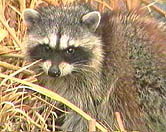
THURSDAY, Dec. 30 (HealthDay News) — Certain species of wildlife are adopting an urban American diet, a new study finds.
Because of increasing urbanization, people and animals are living closer together and interacting more than ever before. For example, foxes, raccoons and opossums often scavenge leftovers from drive-thrus rather than hunt mice, rats, birds and other prey.
For this study, which appears in the December issue of the Journal of Mammalogy, researchers analyzed hair samples collected from people and endangered San Joaquin kit foxes in and around Bakersfield, Calif. They found similarities that suggest a shared food source.
Foxes living in the city had significantly higher carbon and lower nitrogen values than foxes in adjacent rural areas. The urban foxes also had higher cholesterol levels.
High carbon values indicate a diet high in corn or its derivative, corn syrup. Processed foods in North American contain large amounts of corn products and have high carbon values.
It might be assumed that foxes that eat processed foods would have a deficient diet that would lead to poorer health and development and lower rates of reproduction. But this study found that urban foxes have higher survival and birth rates than rural foxes. This may be because foxes in rural areas have a greater number of predators, said the researchers in a journal news release.
More information
The American Academy of Family Physicians offers tips for healthy eating.

